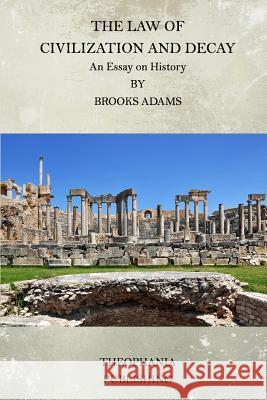The Law of Civilization and Decay: An Essay on History » książka
The Law of Civilization and Decay: An Essay on History
ISBN-13: 9781519287502 / Angielski / Miękka / 2015 / 398 str.
The Law of Civilization and Decay: An Essay on History
ISBN-13: 9781519287502 / Angielski / Miękka / 2015 / 398 str.
(netto: 97,26 VAT: 5%)
Najniższa cena z 30 dni: 100,74
ok. 16-18 dni roboczych.
Darmowa dostawa!
Thank you for checking out this book by Theophania Publishing. We appreciate your business and look forward to serving you soon. We have thousands of titles available, and we invite you to search for us by name, contact us via our website, or download our most recent catalogues. In offering to the public a second edition of The Law of Civilization and Decay I take the opportunity to say emphatically that such value as the essay may have lies in its freedom from any preconceived bias. All theories contained in the book, whether religious or economic, are the effect, and not the cause, of the way in which the facts unfolded themselves. I have been passive. The value of history lies not in the multitude of facts collected, but in their relation to each other, and in this respect an author can have no larger responsibility than any other scientific observer. If the sequence of events seems to indicate the existence of a law governing social development, such a law may be suggested, but to approve or disapprove of it would be as futile as to discuss the moral bearings of gravitation. Some years ago, when writing a sketch of the history of the colony of Massachusetts Bay, I became deeply interested in certain religious aspects of the Reformation, which seemed hardly reconcilable with the theories usually advanced to explain them. After the book had been published, I continued reading theology, and, step by step, was led back, through the schoolmen and the crusades, to the revival of the pilgrimage to Palestine, which followed upon the conversion of the Huns. As ferocious pagans, the Huns had long closed the road to Constantinople; but the change which swept over Europe after the year 1000, when Saint Stephen was crowned, was unmistakable; the West received an impulsion from the East. I thus became convinced that religious enthusiasm, which, by stimulating the pilgrimage, restored communication between the Bosphorus and the Rhine, was the power which produced the accelerated movement culminating in modern centralization.
Zawartość książki może nie spełniać oczekiwań – reklamacje nie obejmują treści, która mogła nie być redakcyjnie ani merytorycznie opracowana.











